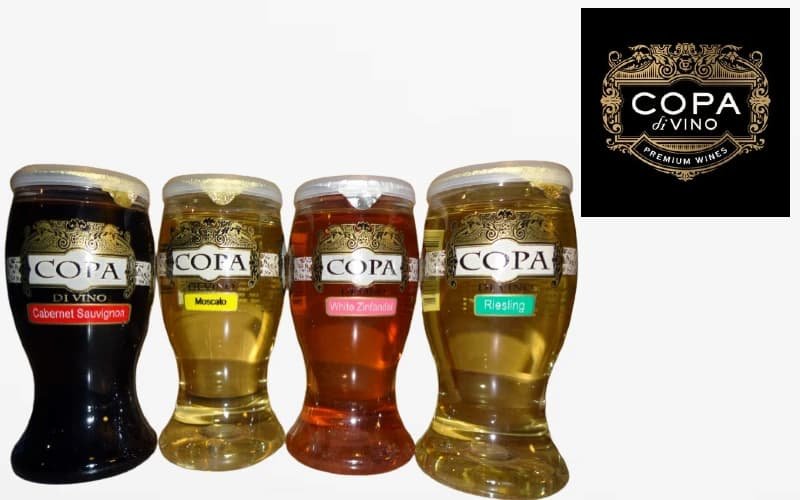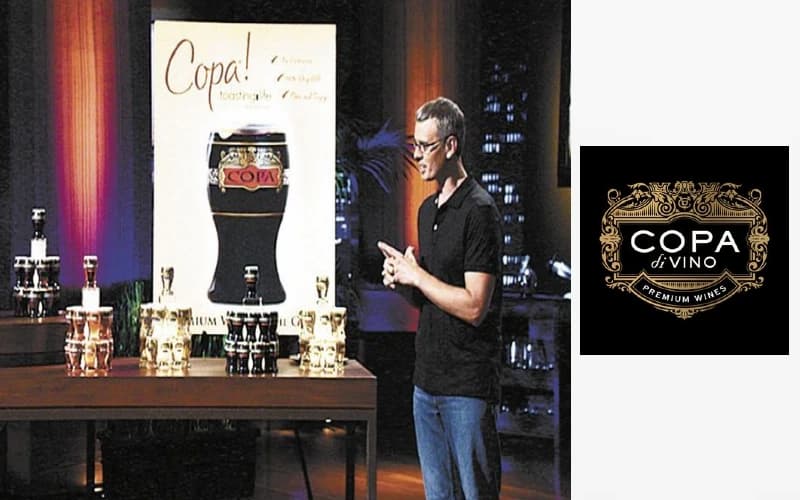James Martin hails from a seven-generation family of Oregon farmers who has lived and worked on their farm. He moved back to Oregon to raise a family on acreage bequeathed to him after leaving the region to work in the technology business.
After returning to his tiny Oregon farming village, James developed a liking for wine and decided to create his own, naming his wine Copa Di Vino, which means “a glass of wine,” with the goal of making his wine more accessible to wine fans. James created a new technique that would enable winemakers to bottle wine in a whole different way.
His ultimate ambition was to be the first entrepreneur ever asked to join Shark Tank’s panel of sharks. James went into Shark Tank with the goal of using his contacts to sell more Copa di Vino to a larger audience.
Table of Contents
Shark Tank’s Copa Di Vino
Season 2 Episode 1 Of Shark Tank
James appeared on Shark Tank and asked for a $600,000 investment in return for a 20% stake in Copa di Vino. James’ favourite way to celebrate with family and friends is with a glass of wine, but entertaining outdoors and at special events makes drinking a glass of wine problematic due to bottles, corkscrews, and the fragility of wine glasses. All consumers have to do with Copa di Vino is pop open the top to sample and savour exquisite wines from all across the nation.
For entertainment establishments wishing to offer premium wine by the glass, James tells the Sharks that Copa di Vino will be a game-changer. He believes that large merchants and sports arenas are interested in serving Copa di Vino. He needs assistance in order to increase inventory and fulfil current and future orders using what he claims is the most innovative wine packaging in decades.
Purchasing the grapes for his wine from local vineyards owned by friends, he now produces roughly 2,500 cases of wine each year, distributing his wine in 26 states throughout the nation via the top wine wholesalers. He makes money from three different sources: Copa di Vino licencing and royalties, bottling services and establishing customers’ own wine brands.
Copa Di Vino Had Been On The Market For Five Months And Had Generated Sales Of Roughly $500,000.
Kevin informs James that Copa di Vino is more of an industrial wine than quality wine. Kevin is accused of being a wine snob by Barbara. Kevin responds that, rather than selling the wine itself, he believes the packaging is the most appealing aspect of his company.
The wine will last a year if it is packaged in James’ distinctive packaging. He patented the packaging after working with some of the world’s best labs to develop a method for atmospherically packaging liquid that would not break the seal under pressure.
James has signed deals to sell Copa di Vino to all Kroger and Ralphs stores and is now in talks with 7-Eleven. He’s also attempting to sell Copa di Vino to two of the world’s largest wine firms.
In the following year, he expects Copa di Vino to earn $3 million to $4 million in sales, catering to specialised wine demands in the sector without requiring them to invest in the equipment required to create wine by the glass.
Come And Go Copa Di Vino Offers

Daymond Decides That The Company And James’ Projections Are Too Early To Invest In, And He Withdraws.
Mark informs James that he would be willing to invest only in the patent, leaving the wine company to James to run as he sees fit. Mark is informed by James that he may resell Copa di Vino wine-by-the-glass at his stadium. Mark answers by informing James that the commission sales industry is not for him.
Barbara is also out since she doesn’t believe she has anything to contribute to the table, even if she was interested in the goods.
Kevin believes that the actual value in Copa di Vino is in the intellectual property portion of the company, which is the greatest method to grow the wine-by-the-glass segment of the market, with James generating more money every time a glass of wine is opened. The Shark asks James how much of Copa di Vino’s intellectual property he might acquire for $600,000, but James says he isn’t willing to give up his patent.
James said that he knows the industry and has run the statistics on his own. He believes the bottling side of the firm has the largest profit potential, rather than the intellectual property side.
Kevin makes a $600,000 offer in return for 51 per cent ownership of the Copa di Vino patent. He informs James that he would take care of all aspects of the company, including licencing so that James can focus on branding and bottling. James believes the opportunity has much more potential.
Mark informs James that the arrangement Kevin has presented is much superior to anything he could give. He said that he would never agree to such a deal and withdrew from the discussions.
James agrees that Kevin’s offer would be a great opportunity for him, but he believes it would be foolish for him to lose control of the most important part of the business, especially after investing $1 million of his own money into Copa di Vino, so he declines the offer and counters with a $3 million offer for 51 per cent of the company. Kevin refuses the offer right away.
What Has Happened To Him? After Shark Tank, There’s A Wine Tasting

James left the Tank without receiving a contract from the Sharks because he believed the offers would devalue his company, and he did not go on the programme to divorce his patent from the brand.
James returned to Shark Tank a few years later, hoping to earn an offer from the panel that he could take, but he left without a contract.
Despite missing out on vital investment money from the Sharks, Copa di Vino is still in business, selling a broad selection of wines and continuing to prosper. He forged cooperation with Pascal Carvin, an inventor and wine bottler, which resulted in higher sales and profits.
Royal Pitch is not linked with Copa Di Vino, Shark Tank, or any of its subsidiaries, and the information presented in this article is only for educational purposes.
Visit the rest of the site for more articles.






























































































































































































































































































































































































































































































































































































































































































































































































































































































































































































































































































































































































































0